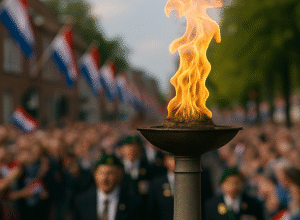Leaving home isn’t always dramatic. Sometimes it looks like checking off a spreadsheet, scanning QR codes, packing things into vacuum-sealed cubes. But beneath the logistics, there’s usually a quieter truth: fear. It rises in the days and weeks before departure—a whisper, a wave, or a full-on internal monologue: What if I hate it? What if I’m lonely? What if I can’t do this?
If you’re considering a move abroad—especially to a place like the Netherlands, with its tangle of bicycle rules, bureaucracy, and unfamiliar social norms—it’s not just normal to feel afraid. It’s inevitable. Fear is a kind of border crossing, too.
But here’s the quiet truth many of us learn: the fear doesn’t stay as big as it feels right now. And it doesn’t mean you’re not ready. It just means you’re human.
Let’s look at some of the most common fears that come with moving abroad—and the small, steady ways they start to ease.
1. The Fear of Losing Your Support System
You leave behind your family, your friends, your regular coffee shop where they know your order. You leave behind a kind of emotional shorthand—people who understand your jokes, your references, your rhythms.
And at first, yes, it can be lonely. But loneliness isn’t a permanent condition; it’s an invitation. New friendships don’t tend to arrive at airports holding welcome signs. They form in the places where you show up most consistently.
For some, that’s work. For others, it’s language classes, dog parks, volunteering, or even the gym. I made my first real friends in the Netherlands by doing what I love: lifting heavy things and sweating beside strangers. The gym wasn’t just a place to exercise; it became a bridge. You don’t have to become someone else to connect here. You just have to keep showing up as yourself, consistently enough that others can find you.
2. The Fear of Making a Huge Mistake
What if you uproot your life and hate it? What if it doesn’t work out? What if you regret it?
This fear is deeply practical—and it can be paralyzing. But one way through it is to look at the risk/reward ratio. I’ve always lived by this metric: every time anxiety flared, I weighed the potential rewards against the risks. And time after time, the rewards—growth, adventure, a deeper sense of possibility—came out ahead.
Mistakes are possible. But so is expansion. And it helps to remember: very little about this kind of move is permanent. I remember driving away from my beloved mountains, watching them shrink in the rearview mirror of my Jeep Gladiator, thinking, I can come back. If this doesn’t work, I can come back.
Knowing you can reverse course makes it easier to move forward.
3. The Fear of Not Belonging
You don’t speak the language fluently. You don’t understand why the cashier greets you with “Bonnetje mee?” You forget to tap your card on the tram. You feel, in a hundred small ways, like an outsider.
But over time, that sharp edge dulls. You learn how the Dutch appreciate directness and efficiency. You notice how quickly “small talk” is replaced with real talk. And you find that belonging isn’t about pretending to be Dutch. It’s about being a respectful participant in the life you’ve chosen—mistakes and all.
Even in your awkwardness, you’re building a kind of belonging. One grocery checkout, one bike ride, one “sorry, my Dutch is bad but I’m trying” conversation at a time.
4. The Fear of Financial Instability
Money fears have a way of waking you up at 3:17am. Will I find a job? Can I afford housing? What about taxes, insurance, currency exchange?
The Dutch system, while notoriously bureaucratic, is also fairly robust once you understand it. The key is to prepare. Learn the basics of the 30% ruling (and if it is applicable to your situation), how Dutch health insurance works, and what to expect in the rental market (spoiler: finding housing can be difficult, so start early and be persistent).
Use budgeting tools. Find local expat groups who can recommend trustworthy accountants or financial advisors. This fear eases with information—and with time. You don’t have to figure it all out at once. You just have to keep moving forward, one form, one appointment, one answer at a time.
5. The Fear of Losing Yourself
Perhaps the most intimate fear of all: away from everything you know, who will you be?
I left behind not just people and places, but a strong sense of identity: Jeep guy, mountain guy, Eddie Bauer guy, Patagonia guy, and American west through and through. Letting go of that was hard. Identities don’t shed easily.
But over time, that identity didn’t disappear—it evolved. The Jeep gave way to trains and bikes. The mountains were replaced (somewhat) by the sea and the vast, wind-swept Dutch beaches. I miss the mountains still, but I’m not lost without them. A quieter self has emerged, one shaped not by terrain or vehicle, but by values, rituals, and presence.
You don’t lose yourself when you move abroad. You meet new parts of yourself. Sometimes, parts that feel more you than ever before.
Closing: A Quiet Reassurance
Fear has a way of dressing itself up as logic. It speaks in urgent tones: Be careful. Stay safe. Don’t risk it. But moving abroad isn’t about recklessness. It’s about trusting yourself enough to try.
No one does this without fear. And no one who sticks with it stays stuck in that fear forever. You adapt. You find your people. You laugh at your early mistakes. You learn the names of streets, the flavor of the wind, the rhythm of the crosswalk lights.
You realize: I can do this.
And you already are.
Want more support with your move to the Netherlands? I share honest, practical posts about expat life, cost of living, housing, cultural shifts, and more. Sign up for the newsletter or explore the archive for real-world insight from someone who’s living it.








